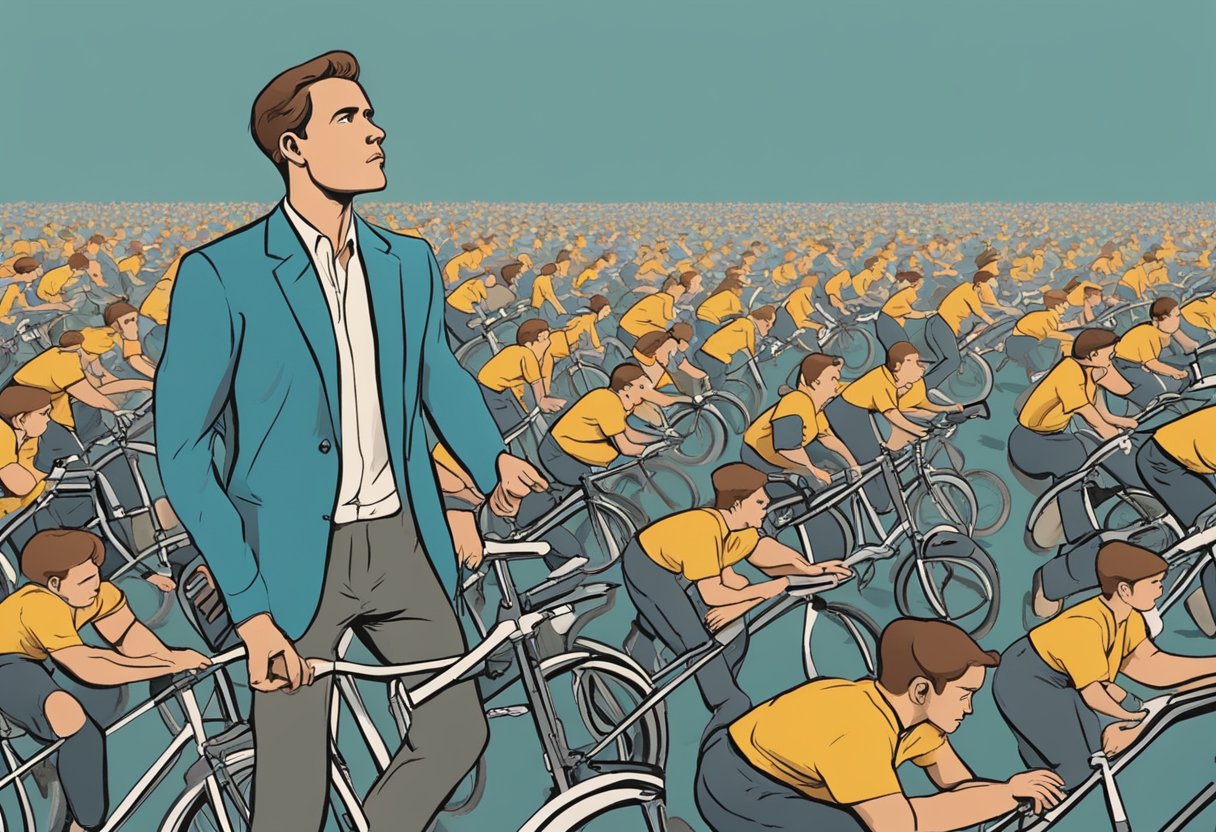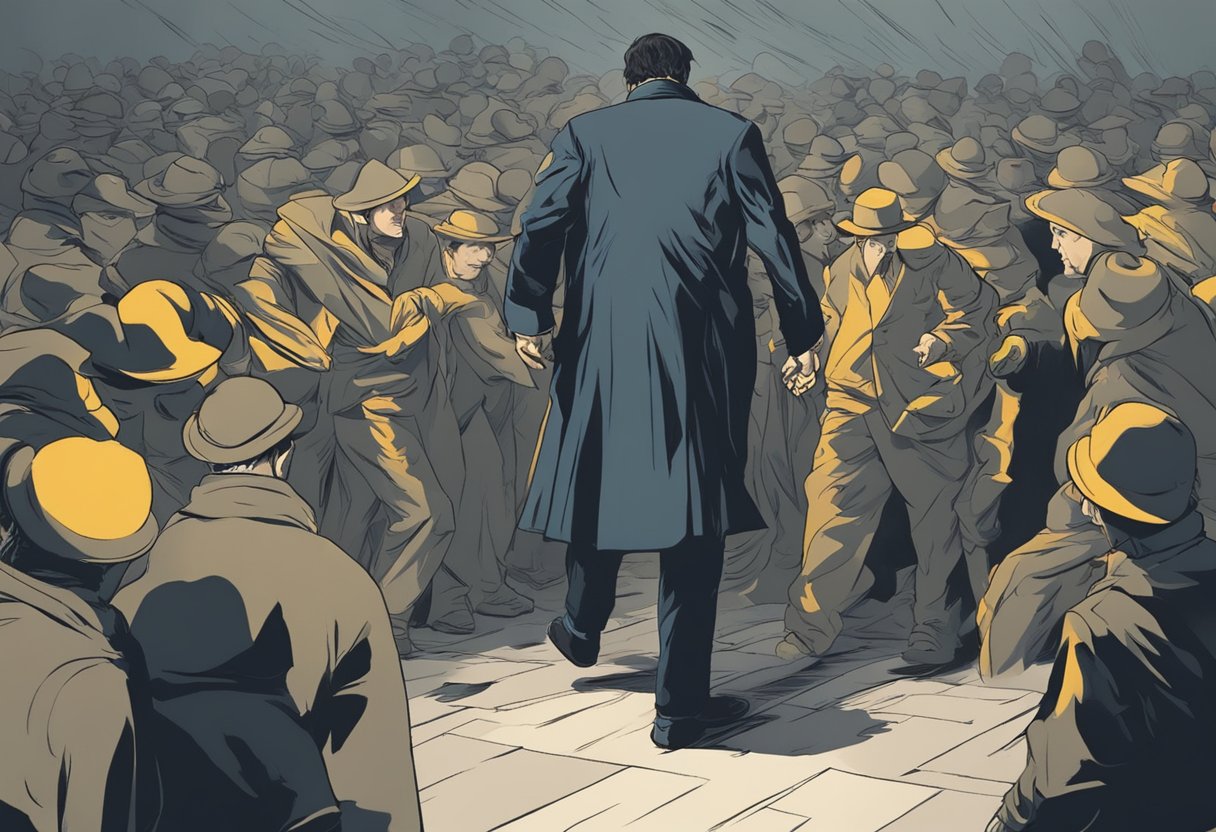Are you feeling like your man runs away when you make attempts to connect with him?
You are not alone, and it’s ok…we will unravel this conundrum in this article.
When a man starts to distance himself from a woman he has feelings for, it’s a perplexing.
His retreat can seem counterintuitive because society often expects that a man will pursue the woman he likes.
However, men, like women, can deal with complex emotions and fears that may cause them to pull away, even if they have genuine feelings toward someone.
Understanding these underlying reasons requires delving into male psychology and recognizing the pressures and fears that are commonly associated with the start of a new relationship or deepening feelings.
Would you like to discover exactly how committed he is to your relationship? CLICK HERE to find out with this specially crafted quiz!
Many factors can contribute to a man’s decision to withdraw when he is experiencing strong feelings.
It’s not uncommon for men to fear intimacy to some extent, which manifests in them running away when they are on the precipice of becoming emotionally attached.
Emotional vulnerability can be daunting, particularly if a man has been hurt or betrayed in the past. Sometimes, a man may feel overwhelmed by what he perceives as demands on his time and emotions, or he might be questioning his ability to fulfill his partner’s needs.
MORE: 17 Secret Reasons Why Guys Run Away When They Like You.
Key Takeaways
- Men might retreat from a relationship due to not being ok with emotional vulnerability or because of past hurts.
- He could be running away due to concerns about meeting your needs or overwhelming demands – these things can cause his withdrawal.
- Fear of intimacy and commitment can lead to men distancing themselves even when they have strong feelings.
Why Do Men Run Away From Love?
1) He thinks he can’t make you happy

Look: if a guy likes you, then he simply has to see you (or make you) happy.
So when a man perceives that he cannot fulfil a woman’s emotional needs, he may retreat from the relationship.
This feeling or belief can sprout from several psychological and emotional factors:
- Self-doubt: A man might question his ability to satisfy or contribute positively to a woman’s life.
- Past experiences: Previous relationships might influence his outlook, inciting a fear of repeating patterns of disappointment.
Possible triggers for his feelings:
- Regular instances where attempts to please you seem to fail, as explained by Helena Hart Coaching.
- Perceiving that his actions don’t yield the expected positive reactions from you.
Why this causes him to run away:
- Avoidance of Failure: He prefers to withdraw rather than face the possibility of failure in making you happy.
- Fear of emotional pain: Both for himself and for you, as dealing with the perception of inadequacy might be too distressing.
- He’s not feeling like your hero: Quite simply, if he feels like he can’t help you or be of use in your life, he’ll likely retreat. Yes, even the best of men will do this. Read more on triggering his hero instinct here.
How he might justify his actions:
- Believing that leaving is a form of self-sacrifice for your ultimate happiness.
- Convincing himself that you’ll be better off with someone who can meet your expectations and needs.
Actions he might take:
- He may become less communicative, seeking to create emotional distance.
- He could start detaching from the relationship, potentially leading to a complete withdrawal.
Understanding these dynamics can provide valuable insights for both of you to address the issues in your relationship and foster a more supportive and open relationship.
2) He is under too much stress in his life

When a man is grappling with a high level of stress, whether from work, financial pressures, or family commitments, it can heavily impact his emotional availability.
RELATED: How to Get An Emotionally Unavailable Man to Chase You: 14 Genius Ways.
Under such circumstances, stress can trigger a fight-or-flight response, and, quite often for men, the instinct is to ‘fly’ away from additional sources of stress, including burgeoning relationships, even those they feel positively about.
Of course, not every man is going to fly away, but if yours does, we kind of have to work with the person he is.
Factors That Might Be Contribiting to His High Stress Levels:
- Work demands
- Financial pressure
- Family responsibilities
Why Stress Leads to Withdrawal:
- Need for problem-solving: Men may prioritize finding solutions to their stressors before engaging in a relationship.
- Perceived weakness: Some men believe that appearing stressed or vulnerable is a sign of weakness and thus pull away to deal with issues independently.
- Preserving self-image: To maintain an image of strength, a man might withdraw rather than show any sort of struggle or doubt.
Behavioral Signs of a Stressed Man:
- Less communicative
- ↑ Irritability
- ↓ Desire to socialize
For many men, addressing stress is often done in solitude, as explained in an article highlighting why men withdraw.
Understanding this can be pivotal in navigating the early stages of dating when faced with a stressed man.
Not all men ready themselves to change their life or routine for a relationship, especially when under pressure, which aligns with observations on men’s tendencies to run away from love.
Want to lean ONE thing you can say to him that will capture his attention in an instant? CLICK here to discover the one thing you can say to ANY man that will capture his attention, trigger his curiosity and make him hang onto every word you say!
3) You were sending out low value woman vibes

Occasionally, men retreat because they perceive what might be called “low value woman vibes.”
This term refers to behaviors and attitudes that men might interpret as a warning of the future pain he might be in if he stays with you.
But what does low value really mean?
It means a woman is extracting far more value than she gives. and often, this is sadly counterintuitive for us women, as we tend to give what we as women would perceive value in.
But it’s not just that.
Poor relational habits and extreme selfishness can cause a woman to show up low value, and trigger a man to retreat.
Did you know that there Are 7 Common Signs That A Woman is Perceived as Low Value to All Men. Do You Know What They Are & How to Avoid Them Like the Plague?
CLICK here to discover the 7 common signs that a woman is perceived as low value in the eyes of men in this special report. (Why is this important? Because men and women perceive value very differently and you don’t want to be making mistakes that would cause quality men to dismiss, abandon or alienate you.)
Traits of Low Value Women:
- Seeking constant validation: A perpetual need for approval, such as fishing for compliments or reassurance, can suggest insecurity. It is vital for an individual to find confidence from within rather than depending on others for it.
- Over-accommodating: Routinely placing someone else’s needs above one’s own, to the point of self-neglect, conveys a lack of self-worth. Self-respect attracts respect from others, so maintaining personal boundaries is essential.
Behaviors to Reconsider:
- Not considering his perspective.
- Always saying ‘yes’, which might indicate a fear of intimacy, confrontation or rejection rather than genuine interest or flexibility.
Addressing these vibes involves introspection and a willingness to adopt healthier habits that reflect self-esteem and individual value.
4) You’re Demanding Too Much, Too Soon

Sometimes, a man might start distancing himself because he feels overwhelmed by the pace at which a relationship is progressing.
It’s crucial to remember that each person (and each man) has their own speed of becoming comfortable with new levels of commitment and expectations.
- Too much expectation: If a woman expresses intense future plans or presses for a commitment very early in dating, a man might feel that the relationship is moving faster than he is ready for. For instance, talking about living together or marriage within the first few months may trigger a retreat response.
- Rapid increase in communication: A sudden and significant increase in text messages, phone calls, and social media interaction can convey that you’re demanding more of his time than he’s prepared to give. It’s not unusual for men to take a step back when they’re expected to be in constant contact.
- Pressure for emotional disclosure: Men are often cautious about opening up and sharing their deeper feelings. Pressuring for vulnerable conversations early can cause discomfort if he’s still gauging the emotional safety of the space between you.
The key to maintaining a healthy dynamic is balance. Balancing togetherness with individual space, and expectations with the natural development of the connection, can help prevent a man from feeling the need to run away.
Additionally, there are key steps to take today if you want him to emotionally commit to you. Check this article for the 5 reasons why he will not commit to you.
5) He Feels Used

When a man senses that he’s being valued more for what he provides rather than who he is, it can trigger a fear of being used.
This feeling may prompt him to pull back, despite any genuine affection he holds. Consider the following points:
- Appreciation versus Utilization: If men perceive more recognition for their assets, efforts, or status rather than their personal qualities, it can lead to doubt about a woman’s intentions.
- Fear of Exploitation: When the balance tips too heavily towards what a man can offer—be it materially or through his connections—he might worry that the emotional bond is not the primary interest.
Responses to Feeling Used:
- He may withdraw as a self-protective measure.
- His communication might become infrequent, creating emotional distance.
- The dynamic of interactions may shift, becoming more guarded or less personal.
It’s imperative to reflect on the nature of exchanges in the dating phase.
A relationship built on mutual respect and genuine affection, rather than utilities exchanged, will likely discourage this fear.
6) He loves you, but he’s not IN love with you

When a man expresses that he loves a woman but clarifies that he’s not “in love” with her, it indicates that the romantic connection and juice is simply not there.
This is not because you’ve done anything wrong, but rather, it’s because he may have placed you in what is called the “one of many” basket rather than the one and only.
A man can still love a woman in his one of many basket, but he won’t fully commit emotionally, because that romantic bond has not been forged (right form the beginning).
To learn the 5 secrets to how you can be in any man’s “one and only” basket, CLICK here.
So what exactly is he feeling, if he’s NOT in love?
- Affection vs. Passion: This distinction often implies he holds affection for you, possibly stemming from long-term familiarity or respect. Nonetheless, the powerful, romantic passion typically associated with being “in love” is absent.
- Comfort Over Desire: The semantics of his articulation suggest a foundation of companionship and comfort, rather than a deep desire or long-term romantic aspirations.
Examples might include:
- A shared history and mutual care that does not ignite the fervor of romantic love.
- Consistent, reliable support in each other’s lives without a deeper yearning for future intertwining.
Facing this situation can be profoundly painful and perplexing.
The differentiation between types of love is a significant one, with a man’s indication of not being “in love” often signaling a serious reflection on the relationship’s trajectory.
- Emotional Dullness: In certain cases, external factors such as depression can contribute to the dampening of emotional intensity, thus influencing the way he feels about the relationship.
Understanding this complex emotional stance requires acknowledging the difference between loving someone as a cherished person in life versus the deep, consuming romantic love usually associated with a committed relationship.
What Is The One Specific Emotional Trigger Within Every Single Man in this World That Inspires Him to WANT to Commit to One Woman, Want to Take Care of Her, Worship Her and Only Her? CLICK to find out.
7) He’s Stuck in His Routine

Men are often creatures of habit, and a new relationship could disrupt a man’s established routine. If he enjoys his current lifestyle and daily rituals, the thought of incorporating someone new into his life might feel daunting. Fear of change is a significant factor:
- Comfort Zone: Many men find their comfort in the predictability of their routines. Deviating from this can cause anxiety.
- Priorities: He might prioritize personal hobbies or a fixed schedule over the spontaneous nature of a new relationship.
Examples of how a routine might contribute to a man’s hesitance:
- Daily Rituals: Going to the gym, reading, or playing video games at the same time daily might be his way to unwind.
- Social Commitments: Regular outings with friends or weekend sports may take precedence.
Men who are particular about their habits might shy away from the adjustments that a relationship requires. Integrating someone else into their day-to-day life entails changes they might not be ready to make.
Significant disruptions that cause a man to retreat could include:
- Time Management: Relationships demand time, and finding balance could overwhelm him.
- Personal Space: He might value time alone more than he anticipates, leading to a pullback when faced with sharing his space and time.
Understanding the comfort a man finds in his routine can clarify why he might distance himself despite emotional attachment. Adjustments, both minor and significant, require effort and a shift in perspective that not every man is immediately prepared to undertake.
8) He was betrayed by someone in the past

Betrayal is a piercing wound that can leave a lasting scar on a man’s emotional well-being.
It doesn’t have to be a woman who betrayed him, it could have been a sibling, a good friend, or even a parent.
Men who have endured this form of deep-seated treachery often carry heavy emotional baggage that affects their future relationships.
When a man is betrayed by someone he trusted, his ability to open up can be significantly hampered. Examples of such betrayal may include:
- Cheating: Discovering a significant other was unfaithful.
- Trust violations: Having personal confidences broken by close friends.
- Deception in family: Being misled or tricked by family members whom he considered dependable.
Here are some ways this past betrayal might manifest in his present behavior:
- Reluctance to Commit: A fear of experiencing similar hurt may cause him to hesitate in committing to a new relationship.
- Emotional Walls: He might build protective barriers, avoiding deep emotional investments.
- Trust Issues: He might excessively question or doubt the intentions of others.
Experiencing betrayal can also lead to trust trauma, which bolsters a cycle of avoidance. According to Healthline, this trauma has tangible psychological repercussions, causing some to shy away from forming close bonds entirely.
Ultimately, until he confronts and processes these past wounds, a man who has been burned by betrayal may continue to run away, even when he harbors genuine feelings for someone.
9) He’s Incapable of Connecting Emotionally

Some men find it challenging to engage in deep emotional connections.
This inability can result from a variety of factors, including past traumas and learned behaviors. Men with an avoidant attachment style often demonstrate this trait; they might long for intimacy but fear the vulnerability that comes with it.
Reasons for Emotional Disconnection:
- Childhood Trauma: Early experiences can shape attachment styles, leading some individuals to struggle with forming secure emotional bonds.
- Past Relationships: A history of tumultuous relationships might push a man to safeguard his emotions by keeping a distance.
- Fear of Dependency: Reluctance to rely on someone emotionally may compel him to pull away despite his feelings.
Behavioral Signs:
- Withdrawal: He avoids conversations about feelings or the future.
- Inconsistency: His engagement might be erratic, with periods of closeness followed by withdrawal.
- Independence: There’s a strong emphasis on self-reliance, even within the relationship context.
Some solutions:
- Creating a safe space for emotional expression.
- Encouraging positive interactions and reinforcing the benefits of emotional connection rather than assuming it will lead to negative outcomes.
These behaviors and solutions are reflected in a broader psychological understanding, as noted by discussions on NCRW.
A man’s incapacity to connect emotionally doesn’t mean he is short of affection but indicates a need for patience and often, professional support to navigate intimacy.
If you feel like you are dealing with an avoidant, here are 11 Genius Ways to Communicate to An Avoidant Partner.
10) He has an insecure attachment style
In the realm of romantic connections, attachment styles play a significant role in how individuals engage with significant others.
When a man has an insecure attachment style, it can cause him to withdraw or create distance even if he has strong feelings for a woman.
Characteristics of Insecure Attachment:
- Fear of Abandonment: He may worry that getting too close will inevitably lead to being left.
- Difficulty Trusting: There is a struggle to believe that his affections will be reciprocated or valued.
- Self-Protection: He keeps emotional distance as a safeguard against potential hurt.
How It Manifests in Behavior:
- He pulls away after moments of closeness to regain a sense of safety.
- He may seem hot and cold, swinging from affectionate to distant.
Steps to Overcome Insecure Attachment:
- Therapeutic Intervention: Working with a therapist can help him navigate towards a more secure attachment.
- Self-Awareness: Recognizing patterns can prompt personal growth and healthier relationships.
- Communication: Open dialogue about needs and fears can bridge the gap between closeness and necessary independence.
Understanding that an insecure attachment style is often rooted in early experiences will shed light on his actions.
However, with awareness and effort, these patterns can become less of a barrier to forming lasting, meaningful relationships.
11) Conversely, YOU have an insecure attachment style (thus push him away)
Yes, you. Do you know your own attachment style? If you don’t, then it’s QUIZ TIME: Do I have secure or insecure attachment patterns? CLICK HERE to find out with our specially crafted women-specific 10 Question Quiz!
(Why is this important? It is because your core attachment style largely dictates and influences what happens in your relationship. Thus it’s imperative you understand your core attachment style!)
Having an insecure attachment style can inadvertently cause one to push away a person who expresses interest, even if that interest is reciprocated.
This attachment style can stem from early relationships and affects adult interactions, often leading to a cycle of fear and uncertainty in close connections.
- Anxiety about Relationships: Persistent worry about abandonment can lead to behaviors that put distance between oneself and a partner.
- Avoidance Behavior: An instinct to keep emotional distance can prevent the development of a deeper bond.
For individuals with an insecure attachment style, actions may contradict their genuine feelings. A person might, for example, send mixed signals, alternating between closeness and withdrawal. This fluctuating dynamic can be confusing and, to the man in question, it may feel like he’s being pushed away.
It is crucial to recognize and acknowledge the signs of an insecure attachment style:
- Reluctance to trust: Difficulty believing in someone else’s affection or commitment.
- Sensitivity to signs of rejection: Reading too much into words or actions that seem to indicate a lack of interest.
- Overwhelm by intimacy: Feeling uncomfortable with too much closeness too soon.
By understanding these patterns, one can work towards forming healthier attachments. It involves self-reflection and, when necessary, seeking support through therapy or self-help resources.
It’s important to note that overcoming an insecure attachment is possible. Engaging in personal development and building self-esteem can lead to more secure ways of relating to others. For some, it might also include re-evaluating past influences and deliberately choosing to create new, healthier attachment behaviors.
12) He’s Looking for Something Better
This is one of those unfortunate truths that we might have to face in dating, especially in the digital age.
And it’s not you, it’s simply how things are. It’s the environment and it’s human nature. This doesn’t mean that every man or woman is always looking for something “better”, but it’s a heads up to let you know that it happens, and it’s possible.
One concerning pattern is when he seems to be on a perpetual search for an ideal that perhaps does not exist. Other patterns include him keeping you as a backup option.
Other patterns include:
- Emotional Unpreparedness: At times, a man may feel he isn’t ready to commit and believes there could be someone else who fits better into the image of his ideal future. Unfortunately, this can leave a woman feeling undervalued.
- Fear of Settling: He may fear that settling down will prevent him from meeting someone he perceives could offer him more—whether in looks, status, or personality traits.
- Comparison with Others: Social media and dating apps have exacerbated this mindset, encouraging continual comparison and the belief in an endless array of potentially better matches.
It is crucial to understand that this behavior is reflective of his insecurities, not the woman’s worth. As seen in discussions on misapprehensions about finding the perfect partner, such conduct derives from placing too much emphasis on perfection, often stoked by unrealistic expectations of romance and partnership.
In the end, if a man is always looking for something better, it behooves a woman to consider whether he’s truly capable of recognizing and appreciating her value.
Want my suggestion? If this is you, then start focusing on men who are ready to embrace a genuine connection rather than chasing an unattainable ideal.
Frequently Asked Questions
Understanding the dynamics of why men might pull away even when they have strong feelings can be puzzling. This section explores common questions about the behavior of men who distance themselves despite finding a potential connection with someone.
What leads a man to withdraw even when he finds a potential partner ideal?
He may feel overwhelmed by the intensity of his emotions or unprepared for the responsibilities that come with a deep relationship. Moreover, men are often conditioned to value independence, which can cause them to retreat when faced with the prospect of being deeply connected to someone else.
How might a man’s behavior change when he has strong feelings for someone?
A man’s behavior can become inconsistent; he might show great interest one day and appear aloof the next. Such changes are often driven by an internal struggle to reconcile his feelings with his fear of losing autonomy or getting hurt.
What could be the reasons for a man to distance himself after getting closer emotionally?
Reasons for this behavior might include past traumas, feeling unworthy of love, or simply the fear of the unknown. These factors can cause a man to push away as a means of self-protection.
Can fear of commitment cause a man to pull away, and how does this manifest?
Fear of commitment is a significant reason men pull away. This fear can manifest in avoidance of discussions about the future, a sudden decrease in communication, or reluctance to make plans.
What are the psychological implications when a man chooses to distance himself upon developing romantic feelings?
Psychologically, distancing oneself can lead to a cycle of attachment and withdrawal, creating a barrier to intimacy. This self-sabotaging behavior can stem from an unconscious desire to protect oneself from potential pain of loss or rejection.
In what ways can personal insecurities affect a man’s actions in a relationship where he has deep affections?
Personal insecurities might lead him to question his worthiness of the relationship, catalyzing behaviors like jealousy, overcompensation, or withdrawal as he deals with his self-doubt.






